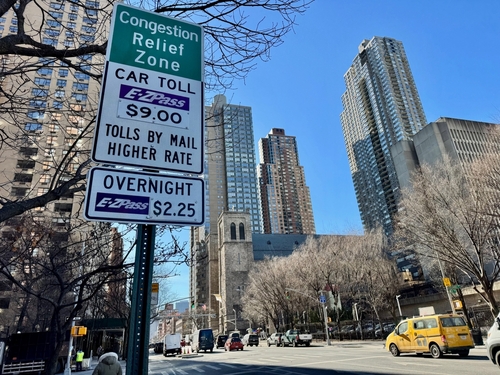Trials & Litigation
After US prosecutors mistakenly file confidential memo, is their challenge to congestion pricing doomed?
Cars drive past congestion pricing signs on Columbus Avenue and 61st Street in New York City in January. (Photo from Shutterstock)
Federal prosecutors have been kicked off a challenge to congestion pricing in New York City after they mistakenly filed a confidential memo saying the government is “very unlikely” to be successful.
The U.S. attorney for the Southern District of New York will be replaced on the case by the U.S. Department of Justice’s Civil Division, according to a statement by the U.S. Department of Transportation.
Law360, Courthouse News Service, ABC News and the New York Times (here and here) have coverage.
“Are SDNY lawyers on this case incompetent or was this their attempt to resist?” the Transportation Department said in a statement cited by news media. “At the very least, it’s legal malpractice. It’s sad to see a premier legal organization continue to fall into such disgrace.”
The U.S. attorney’s office said in a statement the court filing “was a completely honest error and was not intentional in any way. Upon realizing the error, we immediately took steps to have the document removed.”
The confidential memo dated April 11 said there is “considerable litigation risk” in defending efforts by Sean Duffy, the secretary of the Transportation Department, to block the congestion pricing program using an argument that it was not statutorily authorized.
The Federal Highway Administration might be able to properly end the program, however, under regulations concerning the termination of cooperation agreements that no longer further agency priorities, the memo said.
U.S. District Judge Lewis J. Liman of the Southern District of New York said in an April 24 order the mistaken filing raises two questions. The first is whether there is sufficient basis to seal the document after it was published by media outlets. The second is whether the mistaken disclosure waives the applicable attorney-client privilege.
Liman, an appointee of President Donald Trump during his first term, is temporarily keeping the memo under seal and is asking for parties’ responses with due dates of May 2 and May 7.
Disclosure of the memo is “a lawyer’s nightmare,” but it is unlikely to be a deciding factor in the case, said Eric A. Goldstein, a senior attorney with the Natural Resources Defense Council, a nonprofit environmental advocacy group that supports congestion pricing, in an interview with the New York Times.
Little in the memo was surprising, and Liman, the judge in the litigation, is already familiar with the issues after hearing four other challenges to congestion pricing, Goldstein said.
Corey Bearak, a lawyer who opposes congestion pricing, told the New York Times that the Trump administration should consider other ways to challenge the program, including by joining litigants fighting congestion pricing in state court.
Write a letter to the editor, share a story tip or update, or report an error.
